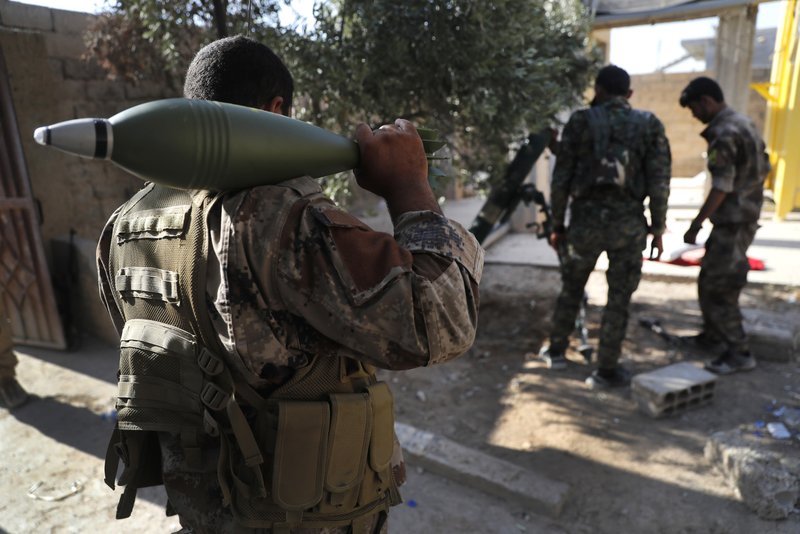BEIRUT -- U.S.-backed, Kurdish-led fighters captured the last town held by the Islamic State group on Friday, after three months of ferocious battles in the militants' single remaining enclave in eastern Syria, activists and Kurdish officials said.
The fall of Hajin marks an end to the extremist group's hold over any significant urban area. The capture of Hajin, however, does not mark the end of the group, which still holds some villages nearby and has a scattered presence and sleeper cells in Iraq and Syria.
As the offensive by the Kurdish-led Syrian Democratic Forces intensified over the past days under the cover of airstrikes by the U.S.-led coalition, Islamic State fighters withdrew south to areas east of the Euphrates river and west of Syrian Democratic Forces positions along the border with Iraq. Among the villages still held by extremists in the enclave are Sousa, Buqaan, Shaafah, Baghouz and Shajla.
The latest push has also raised questions about the fate of Islamic State leader and founder Abu Bakr al-Baghdadi who has not been seen in public since he announced his self-styled caliphate in 2014 from a mosque's pulpit in the Iraqi city of Mosul. Last month, the Islamic State suffered a severe blow when the Kurdish-led forces said they captured Osama Owayed al-Saleh, a top aide to al-Baghdadi.
"It is a very difficult battle," Syrian Democratic Forces spokesman Mustafa Bali said by phone from Syria where he said militant fighters were still attacking Hajin. He added that most of the Islamic State fighters besieged in the enclave were among the most experienced gunmen who came to the area from Iraq and Syria.
"There are still villages to be taken but Hajin was the most important as it was the base for commanders from where they directed military operations," Bali said.
Iraqi Maj. Gen. Qassem Mohammed, in charge of operations in areas close to the Syrian border, said artillery strikes by the U.S.-led coalition on the Iraqi side of the border targeted Hajin and areas around it.
The Britain-based Syrian Observatory for Human Rights said the Kurdish-led forces took Hajin early in the morning. It said some Islamic State fighters withdrew to nearby villages and that fighting was still ongoing in fields outside Hajin.
Europe-based activist Omar Abu Layla of the DeirEzzor 24 monitoring group confirmed that the town had been recaptured, adding that some militant fighters were still holed up in small pockets on the edge of Hajin. Abu Layla said that disagreements among Islamic State ranks over hierarchy between Iraqi and Syrian fighters helped "speed up the collapse."
Nuri Mehmud, spokesman of the Syrian Kurdish militia known as People's Protection Units, also the main component of the Syrian Democratic Forces, said "intense fighting" was still ongoing in small areas.
The area is home to some 15,000 people, including 2,000 Islamic State gunmen who fought back with counteroffensives and suicide attacks. Over the past several days, hundreds of civilians were able to flee the enclave toward areas controlled by the Syrian Democratic Forces east of the Euphrates River and government-controlled regions on the river's west bank. The Observatory said that since the Kurdish-led offensive began on Sept. 10, 922 Islamic State gunmen, 539 coalition fighters and 324 civilians have been killed.
Meanwhile, Turkish President Recep Tayyip Erdogan intensified his criticism of U.S. support for the Syrian Kurdish fighters, saying Friday that Turkey would clear the key northern town of Manbij. Over the summer, the two NATO allies had struck a "road map" to Manbij of the People's Protection Units, which Turkey considers a terror organization linked to an insurgency within its own borders.
The Syrian Democratic Council, the political wing of the Syrian Democratic Forces, denounced Turkey's threat of a military operation against the People's Protection Units and called on Syrians of all ethnic and religious groups to unite ahead of a possible Turkish attack.
Information for this article was contributed by Zeynep Bilginsoy and Qassim Abdul-Zahra of The Associated Press.
A Section on 12/15/2018

